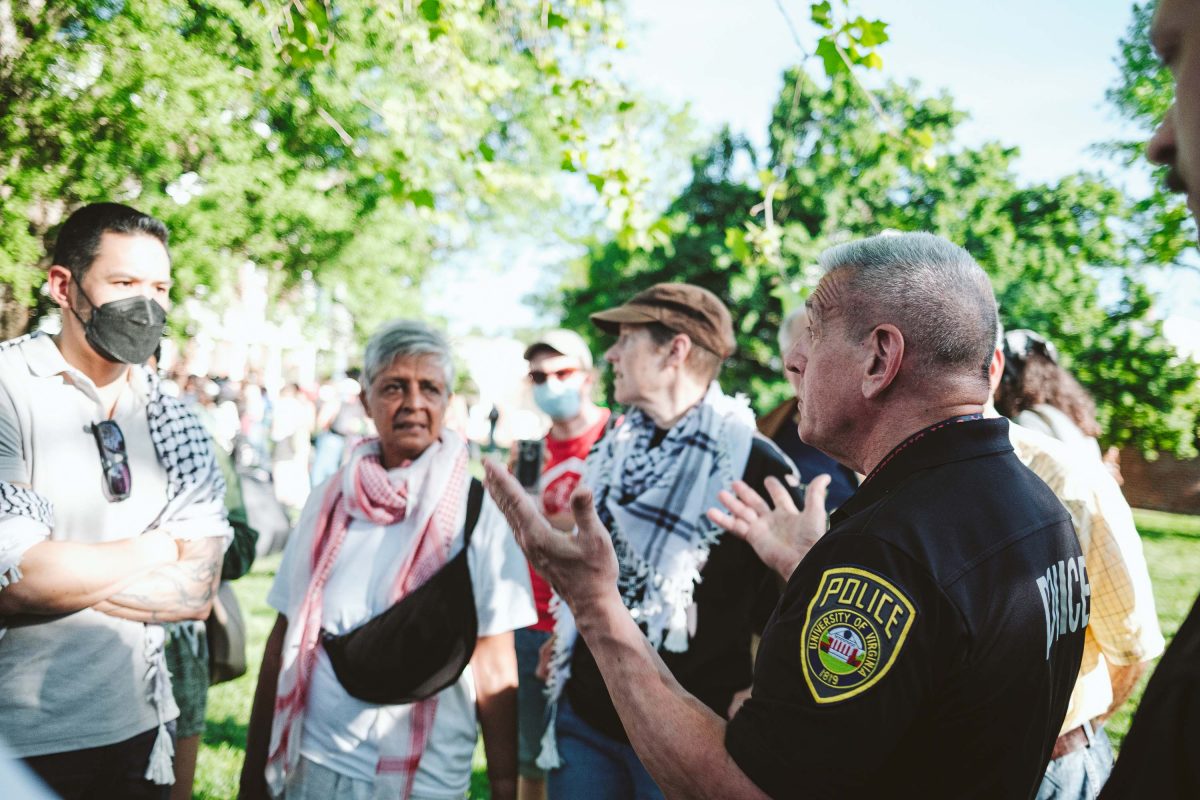More than three months after Virginia State Police forcefully dispersed a pro-Palestine encampment on Grounds, the University of Virginia has dropped all disciplinary action against student protesters arrested on May 4. The dismissal of University Judiciary Committee charges is a victory for student and faculty organizers, but UVA continues to stonewall demonstrator demands for disclosure and divestment.
An alternative resolution for the students facing UJC cases was reached at a meeting on September 11 after UVA Student Affairs amended its conditions for convening with organizers. Previously, Student Affairs required students to meet one-on-one with administrators, with only those not affiliated with the encampment allowed to attend as support persons.
“The students really felt like they were trying to be divided. They wanted to meet as a group,” says Laura Goldblatt, an assistant professor and faculty liaison for pro-Palestine student protesters.
Under the amended conditions, administration and protesters were able to move forward with alternative resolutions for the disciplinary charges. All degrees withheld in connection with the UJC cases are set to be conferred and backdated to May 2024.
During the meeting, student protesters read a statement expressing unequivocal support for Palestinian human rights and their frustrations with UVA.
“At minimum, 41,000 Palestinians, including over 16,500 children, have been murdered by the Israeli military since the start of its genocidal assault on Gaza and the West Bank,” reads a portion of the statement. “We must recognize that these are not mere numbers but represent real lives lost and suffering endured. As we confront these harrowing realities, we must also challenge our institutions to sever their complicity in this violence.”
At the conclusion of the statement, student organizers reaffirmed their calls for UVA to disclose all direct and indirect investments; divest from “institutions materially supporting or profiting from Israel’s genocide, apartheid, and occupation of Palestine;” withdraw from academic relations with Israeli institutions; and ensure the security of faculty, staff, and students supporting Palestine.
“The faculty present all expressed incredible pride in the students for their courage, for the powerful nature of this statement, and for their leadership in this really dark time. Also their conviction in fighting for Palestinian human rights as a matter of liberation for colonized and oppressed peoples here and elsewhere,” says Goldblatt, who was present at the meeting with Student Affairs.
While UVA has repeatedly stated that alternative resolutions were offered to students facing disciplinary action, Goldblatt says Student Affairs shared that the dismissal of UJC cases was delayed in part due to resistance among members of university leadership.
“As we noted over the summer, every student who was facing charges stemming from policy violations committed on May 4 was offered the opportunity to pursue informal resolution in lieu of a UJC trial,” said University Spokesperson Brian Coy in a comment via email. “As of today, all of the students involved have accepted that option and brought these matters to a close. Despite the high profile of this case, the University followed the same disciplinary practices and processes we always do. These students were not treated differently.”
University Communications declined to respond to other C-VILLE requests for comment regarding the dismissal of charges and organizer demands.
While Coy did not comment on organizer demands, a September 13 meeting of the University of Virginia Investment Management Company and Board of Visitors highlighted leadership reluctance toward divestment. UVIMCO Chief Executive Officer Robert Durden emphasized the logistical challenges of divestment and the ideally apolitical nature of UVIMCO.
“We do not like using our investment strategy as a means of expressing a moral or political opinion,” said Durden.
In an interview with C-VILLE, Goldblatt rebuts the idea that failure to divest is not itself a political action.
“[UVIMCO] adopted an Investor Responsibility Framework that they say guides what they decide to invest in,” she says. “Choosing to fund a state that is committing a genocide, and to invest in weapons manufacturers that are creating weapons that are being used in a genocide, is a political decision. … Choosing to fund certain paths is a political one, and so divesting is a political decision, but it’s not like not divesting is somehow not a political decision.”
Despite stricter rules around demonstrations on Grounds, Goldblatt says student and faculty organizers are energized and committed to action.
“UVA, like all other institutions, [is] susceptible to pressure,” she says. “Just because right now UVA says ‘No way’ to divestment does not mean that there’s no path forward. It is our job as those who feel called in this moment to have moral courage to keep putting the pressure on them, to make them do the right thing and to make them live up to their mission of being both good and great.”
